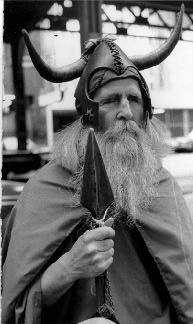This is the sixth portrait in my series on “Meetings With Remarkable People” — ruminations on exceptional individuals I have known and explorations of just what qualities make a person “remarkable.”
Moondog was certainly a unique man, one whose unusual circumstances resulted equally from fate, predisposition, and personal choice. My encounter with him directly affected the direction of my life in several important ways.
I had never heard of Moondog until he came to live with us for a while in our commune in Madison, Wisconsin, in1972. In the course of those weeks, however, we learned that he was rather famous. In a strange way, in certain circles.
My friend and housemate Glenn Johnson and I first encountered him in the park near the Student Union at the University of Wisconsin: a tall man with long grey hair and full grey beard, wearing a Viking’s horned helmet, huge red cape, leggings, and leather tunic. At his side, he had a long spear and some luggage, and he was playing a small hand-drum of some kind — bongos, I think.
Beneath his helmet and above his beard, his face seemed ancient. His features were strong — a noble nose, pronounced brow and cheekbones; the outer corners of his eyes were drawn far down his cheeks, projecting a look of suffering reminiscent of a wandering Christian penitent from the Middle Ages, or perhaps the sage sorrow of an aged Viking warrior, recounting his long years of combat. Later, at our house, he sometimes struck us as a old Druid priest, contemplating interior visions.
It was late August, still hot, and his dress was hardly summer wear. With his face, clothes, stature, and spear, he presented an intimidating figure. Passers-by eyed him curiously but gave him a wide berth. Glenn and I, though, knew ourselves to be strange in our own rights, and we were serious musicians, competent enough to appreciate what he was doing. We stopped and listened and were astonished at the sophistication of his drumming. It was not flashy, but full of shifting metric structures and complex beats — five over seven, say, with alternating four- and five-meter phrases — and composed with the kind of dynamic subtlety we usually associate with melody, not rhythm.
When he took a break, we introduced ourselves. In a gentle, deep voice, he said his name was Moondog and that he’d hitch-hiked to Madison from New York City, the first leg of a longer journey on some errand that I can’t recall.
Hitch-hiking: In itself, that was not so unusual. We had all done some cross-country hitch-hiking, and this was after all the early 1970s. But in Moondog’s case it struck us as extraordinary, because he was completely sightless.
He had been blind since 1932, he told us later, when at the age of 16 he’d been goofing around with a dynamite cap. From close up, we could see that his eyes were mostly closed, with only a slit of milky white occasionally visible between his eyelids.
We talked about music and life, briefly, and he told us he had no place to stay. So we brought him home, gave him one of the extra bedrooms in our house out on Old Sauk Road, about ten miles from downtown. It was a yellow-brick farmhouse, set atop a hill with a barn and silo, sheds and corn cribs, shaded by old walnut trees, surrounded by cornfields. Seven of us lived there, sharing space, money, food, meditation, and music. In town, it was known as “the yoga farm,” but in fact — while we did indeed do yoga — we didn’t raise any of our own food. To make our collective living, we gave music lessons, waited tables, made musical instruments, did odd jobs and carpentry, manufactured our own line of health-food candy bars in our kitchen, or cooked at and helped manage The Sunflower Kitchen, Madison’s first vegetarian restaurant.
It was a big, charming, beat-up old house, and what little furniture we had was from St. Vincent’s; we were poor and wore ragged clothes. I slept in the barn as often as I did the house. We all practiced hatha or kundalini yoga and various meditative disciplines, and we spent almost every night improvising music together — mostly drums and chanting — in the meditation room.
Moondog fit right in.
Next: Moondog, harps, and fireworks.



Just last night I told friends about meeting Moondog on a warm sunny afternoon in late August 1972 in Madison, Wisconsin. I also met him outside the student union. He was sitting on the grass alone, I said hi and spoke for a bit. I had never seen a Viking before, and never heard of him as a musician nor a New York City street presence. He was a gentle soul, very approachable, and not at all pretentious in spite of his unusual outfit. Moondog told me that he and others were performing his music tonight on campus. His music sounded to my young ears like modern classical, but listening to it now, I realize how much more complex and beautiful it is. Thanks to you and your group there was room at the inn for Moondog.